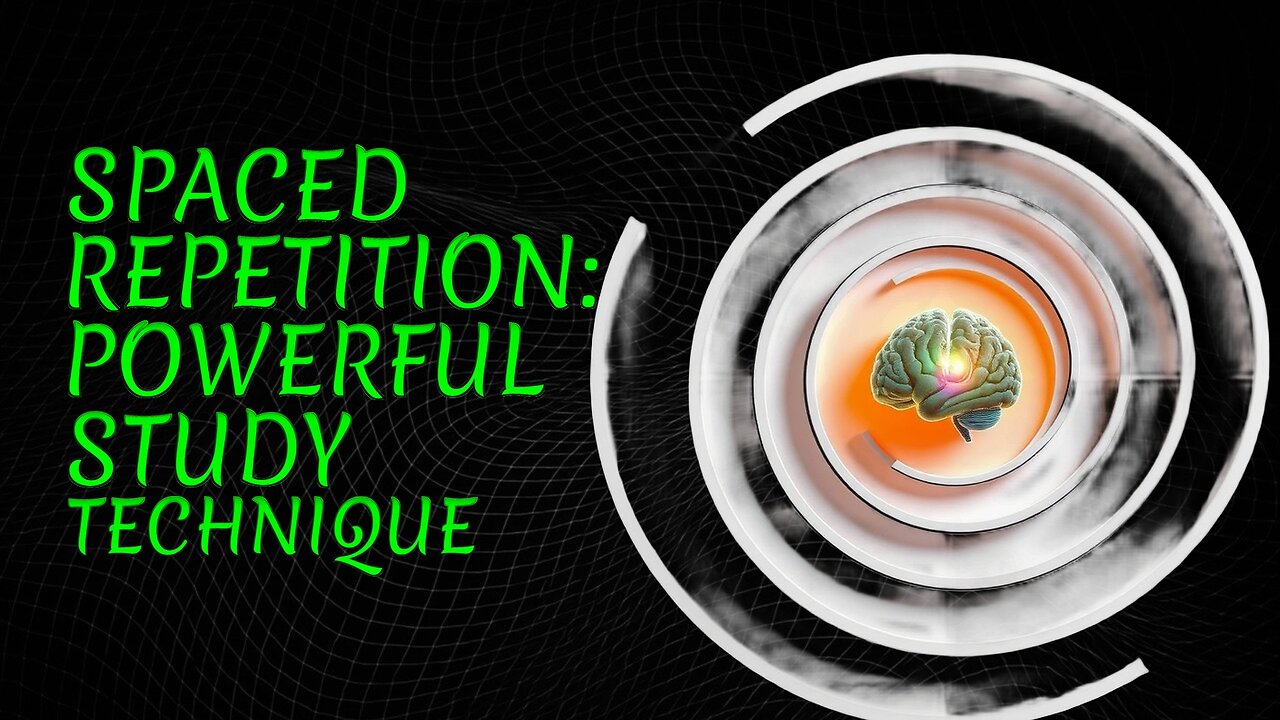Premium Only Content

Spaced Repetition: The most powerful study technique | Understanding Psychology
Title: Spaced Repetition: The most powerful study technique | Understanding Psychology
Description:
Spaced repetition is widely regarded as one of the most effective study techniques, grounded in the principles of cognitive psychology. This method involves reviewing information over increasing intervals of time, rather than cramming it all at once. By spacing out the repetition of the material, learners can significantly enhance their long-term retention and understanding.
The concept of spaced repetition is rooted in the Ebbinghaus Forgetting Curve, a hypothesis proposed by German psychologist Hermann Ebbinghaus. Ebbinghaus discovered that memory retention declines over time, but this decline can be mitigated by reviewing the material at strategic intervals. When information is revisited just before it is about to be forgotten, it reinforces neural pathways, making recall easier and more durable.
One of the key advantages of spaced repetition is its adaptability to various learning styles and subjects. Whether you are studying for an exam, learning a new language, or mastering a musical instrument, incorporating spaced repetition can yield substantial benefits. For example, flashcard systems like Leitner and software applications like Anki utilize spaced repetition algorithms to optimize learning efficiency. These tools present users with information at gradually increasing intervals, ensuring that the material is reviewed just before it is forgotten.
Moreover, spaced repetition is not just about rote memorization; it also enhances deeper understanding and conceptual learning. By revisiting information over time, learners have the opportunity to connect new knowledge with existing knowledge, fostering a more comprehensive grasp of the subject matter. This holistic approach not only improves memory but also strengthens critical thinking and problem-solving skills.
In practical terms, implementing spaced repetition can be as simple as creating a study schedule that spaces out review sessions. For instance, after initially learning new material, one might review it the next day, then again after a week, and subsequently at longer intervals. This structured approach helps combat the natural tendency to forget and ensures that the information remains fresh and accessible.
In conclusion, spaced repetition is a powerful study technique that leverages the principles of cognitive psychology to enhance learning and memory retention. By incorporating spaced repetition into study routines, learners can achieve better long-term retention, deeper understanding, and improved academic performance.
Tags:
spaced repetition, study techniques, cognitive psychology, Ebbinghaus Forgetting Curve, long-term retention, learning efficiency, flashcard systems, Anki, conceptual learning, study schedule
-
 LIVE
LIVE
The Mel K Show
1 hour agoA Republic if You Can Keep It-Americans Must Choose 11-04-25
284 watching -
 UPCOMING
UPCOMING
Grant Stinchfield
34 minutes agoThe Mind Meltdown: Are COVID Shots Fueling America’s Cognitive Collapse?
-
 1:00:46
1:00:46
VINCE
3 hours agoThe Proof Is In The Emails | Episode 161 - 11/04/25
117K87 -
 LIVE
LIVE
Benny Johnson
2 hours ago🚨Trump Releases ALL Evidence Against James Comey in Nuclear Legal BOMBSHELL! It's DARK, US in SHOCK
5,355 watching -
 2:04:05
2:04:05
Badlands Media
10 hours agoBadlands Daily: November 4, 2025
31.3K6 -
 2:59:49
2:59:49
Wendy Bell Radio
7 hours agoBUSTED.
48.9K79 -
 LIVE
LIVE
The Big Mig™
3 hours agoDing Dong The Wicked Witch Pelosi Is Gone
27 watching -
 34:57
34:57
Daniel Davis Deep Dive
3 hours agoFast Tracking Weapons to Ukraine, Close to $3 Billion /Lt Col Daniel Davis
6.12K6 -
 LIVE
LIVE
The State of Freedom
4 hours ago#347 Relentlessly Pursuing Truth, Transparency & Election Integrity w/ Holly Kesler
22 watching -
 1:34:34
1:34:34
Graham Allen
4 hours agoThe MAGA “Civil War” Will LOSE The Midterms! Is A Fracture Coming? ALL Eyes On Key Races!
82.1K41